Our Group
The BRighTEN group, led by Prof. Matilde Inglese, is part of the Department of Neuroscience, Rehabilitation, Ophthalmology, Genetics, Maternal and Child Health (DINOGMI), University of Genoa. It is a multidisciplinary team composed of neurologists, physicists, biomedical engineers, neuropsychologists and students and collaborators.
Our Aim
Our research line is the application and development of methodologies and/or models to estimate parameters characterizing peculiar neurological processes from anatomical and functional 2D/3D/4D images and relate them to clinical outcomes.
MRI research activity involves the qualitative analysis of structural images and the study of brain atrophy by using anatomical T1/T2-weighted images; the quantitative analysis of microstructural parameters derived from diffusion-weighted MRI (dMRI), myelin imaging, perfusion and susceptibility mapping. We also apply methods and models to derive activation maps from functional MRI (fMRI) data sets to study functional brain connectivity from resting state fMRI data and relate them with structural brain connectivity derived from dMRI.
Clinical activity involves both research and standard clinical practice. In our centre, we follow ~2000 patients with multiple sclerosis, treated with the different Disease Modifying Treatments (DMTs) approved for the different stages of the disease. We actively take part in several international clinical trials. Furthermore, a vivid spontaneous research activity is constantly implemented, also thanks to the development of extensive collaboration networks. A distinctive feature of our centre is represented by the expertise in managing complex and aggressive cases of multiple sclerosis, with an international recognition as reference centre for the Autologous Hematopoietic Stem Cells Transplant (AHSCT).
Neuroimaging consists in using various techniques to image the structure, function, or physiology of the nervous system. It is subdivided into two main approaches: Structural imaging, which deals with the structure of the nervous system and can be used for the diagnosis of a large-scale intracranial disease (like tumors, multiple sclerosis lesions, stroke) and injuries (like traumatic brain injury); Functional imaging, which is used to diagnose metabolic diseases (like Alzheimer) and for neurological and cognitive psychology research. These images can be obtained through different modalities, and the BRighTEN group is mostly expert in Magnetic Resonance Imaging (MRI). MRI is a powerful technology that provide two- and three-dimensional images, which allow the evaluation of morphological changes and biological and physiological processes in vivo in humans. In our laboratory we integrate imaging data with other information (either clinical, serological, neuropsychological, etc.) to better understand disease progression, its early diagnosis, and its monitoring. We also perform study of pharmacodynamic and treatment efficacy mostly applied to multiple sclerosis.
